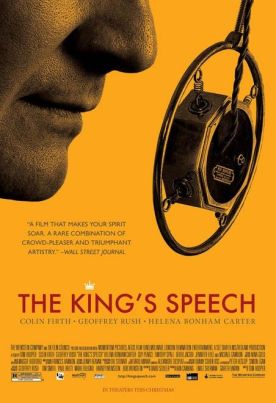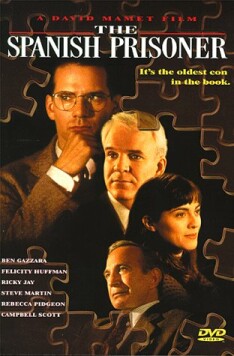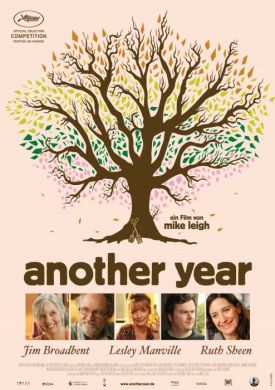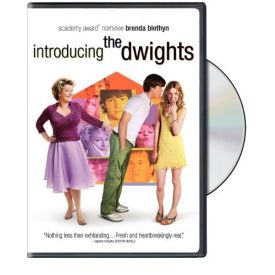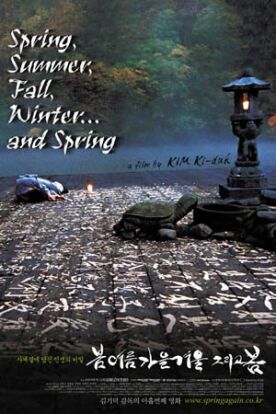King’s Speech, The
Although I very much enjoyed Tom Hooper’s sepia-tinted return to the 1930’s, The King’s Speech, I was also conscious throughout of something very odd about the movie. It has to do with but is not limited to the fact that King George VI (Colin Firth), like all British monarchs since the Stuarts (or perhaps George III, so far as Americans are concerned) was a pretty peripheral historical figure to begin with, while the film’s pathographical aspect — the poor man suffered from a stammer — is also not exactly epic in scale. In the catalogue of human misfortunes, even more severe speech impediments than his would not be numbered among the top ten, nor yet the top hundred and ten, probably, even for someone like the King whose fate it is to have to make public speeches.
The oddness does not end there. There is something faintly ridiculous about attempting to excite our pity for a royal personage in the cultural absence of the kind of tragic stature enjoyed by a King Oedipus or a King Lear — even if his fate were (as it is not) a tragic one. Moreover, in comparison to the world-historical significance of the outbreak of the Second World War, which is the film’s context and which is represented at its climax, the king’s affliction hardly looks like, well, a very big deal. The film works hard to suggest that the fate of the empire and, indeed, the free world depends on the King’s fluency but, really, we know it did not and could not. Yet Mr Firth’s portrayal of the king, together with Geoffrey Rush’s of Lionel Logue, the speech therapist who helps him, is so powerful that while we watch we are scarcely conscious of these difficulties — which, after all, the film has set for itself.
There is yet a further problem. As he is portrayed here, and (I believe) in real life, the king would have loathed the idea of this film’s appeal to our sympathy on his behalf. But in a way this weakness is also the movie’s strength. Just as it portrays “Bertie” (as the future king was known to his family) as someone who hated the very idea of becoming king when his much more glamorous older brother the Prince of Wales (Guy Pearce) — who became, briefly, Edward VIII — unexpectedly abdicated in order to marry the American divorcée Wallis Simpson, so it is itself a paradoxical paean to the human side of a man who rigidly suppressed his human feelings out of a sense of duty to his country. That was something that a great many of his fellow countrymen (and ours) were to have to do too over the next six years and something that today’s audiences must wonder if we can ever do again, even at our most need — which, pray God, will never come again.
That’s why, nearly 60 years after his death, George VI is still able to encourage his admirers to believe again in the unlikeliest of heroes. That, I think, is the appeal of the film to a lot of people. Charles Moore of the London Daily Telegraph put it best, I think — and, by the way, offered a compelling apologia for monarchy itself — when he wrote:
Never before have I seen so clearly depicted just how awful it is to be the British monarch. And, since it is a role which, as Bertie himself points out early on, one cannot choose, the rest of us feel terribly sorry for the person on whom the Crown descends. Whenever republicans attack the “privilege” which surrounds royalty their complaints seldom win much support because anyone with an ounce of imagination can see how frightful the life is, even if (partly because?) you are surrounded by what critics love to call “flunkeys.” This helps explain why the sense of duty is so important. Almost everyone else in public life is visibly keen to get on, trying to survive, trying to be promoted, trying to kick aside rivals, trying to accumulate power, honours and money. It is important to have at least one person at the top who doesn’t really want to be there. It is the precise opposite of Hitler’s terrible will to power, against which George VI had to rally his country. The British people came to love their King precisely because he clearly had no ambition, and yet he did the job all the same, because he knew he must.
This view of the film makes an interesting contrast with Anthony Lane’s in The New Yorker, who experiences it not as a celebration but as a critique of some of these same qualities, together with “all that is clenched and misted-over in the English character.” Much of the picture, he writes, “girds itself in the trimmings of decorum, and revels in the restitution of order, as required by devotees of costume drama; on the other hand, what Logue uncovers, in his sessions with the future king, is something rotten in the state of England, which nothing, not even Australia, can mend.”
Surely, here we must have the secret of the film’s success: that it manages simultaneously to appeal to both sides in the cultural wars that have raged in Britain and America, as elsewhere in the West, since the 1960s: both, that is, to the believers in relaxes and those fighting a presumably doomed rearguard action on behalf of braces. Litterateurs will recognize the allusion to William Blake’s enigmatical dictum: “Curse braces, bless relaxes,” which can also be read two ways. Is it, in other words, braces that are to be cursed and relaxes blessed? Or are we instead to recognize the bracing effects of the curse alongside the entropic relaxation of mere blessing? The answer, as everything about Blake requires us to insist, is yes.
In the same way, the PBS “Masterpiece Classics” series “Downton Abbey” ends with simultaneous disasters for the family of the Earl of Grantham (Hugh Bonneville) and the world at large. The latter disaster is of course the outbreak of World War I, while the former is said to be a result of the fact that someone “must say what I think.” To this the Dowager Countess, played by Maggie Smith, pointedly replies: “I don’t know why. Nobody else does.” There, too, I believe, contemporary audiences must feel at once our morally relaxed culture’s contempt for the inevitable hypocrisies of life in the highly structured and even more highly strictured world of pre-1914 Britain and a kind of grudging admiration for those who felt, for reasons we can hardly imagine anymore, that they had to live according to its rules.
Maybe the relative triviality of the dramatic conflict represented to us in The King’s Speech — which is or ought to be accentuated by contrast with the outbreak of a World War — actually makes the king’s heroism seem more real. That, paradoxically (the guy is a king after all!) makes it more accessible to us, surfeited as we are by a cinematic diet of merely fantastical superheroes — like something we ourselves might be capable of. Maybe here is a heroism we can believe in again. All this is a roundabout way of saying that The King’s Speech is good, yes, but good compared to what? Compared to the other Academy Award nominees as Best Picture for instance. I hope it is also, apart from anything else, a reminder to us playful postmoderns of what a long way just a little bit of reality can still take us.
Discover more from James Bowman
Subscribe to get the latest posts to your email.

